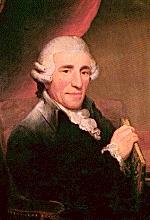![Piano's Solo Corner [Image]](piano8b.gif)
![Piano's Solo Corner [Image]](piano8b.gif)

| Date/Place of Birth: | 31 March, 1732 in Rohrau, Austria. |
| Personality: | Although not particularly good looking, Haydn was a very nice gentleman -
modest, honest, even-tempered, hardworking, generous, had a good sense of humour - with this well-mannered attitude,
he had no enemies at his time.
Came from a poor family, Haydn was not well-educated. However, his self-made genius was astonishing and a French artist, Jean Ingres remarked: "Whoever studies music, let his daily bread be Haydn...the first who created everything, discovered everything, taught everything to the rest!" Evidently, as a young boy, Haydn always struggled to learn all those music stuffs by himself. He said,"I never had a proper teacher. I always started right away with the practical side first in singing and playing instruments, later in composing. I listened more than I studied...therefore little by little my knowledge and ability were developed," In addition, Haydn was a lucky man. He enjoyed a luxurious living with several famous aristocrats who were all music lovers. And yet he was holding a secure and well-paid position as the musical director - doing duties like conducting the orchestra; training the choir; composing music when required; and looking after the instruments and music library. |
| Piano-Playing Style: | Like Schubert, Haydn was not a keyboard virtuoso. Yet he acquired a solid enough technique to enable him to
accept advanced students. Even he himself admitted,"I was no wizard on any instrument, but I knew the potentialities and workings of all. I was not a bad
clavier player or singer, and could also play a violin concerto."
Generally, Haydn's playing was very much in Vienna style - elegant, witty, clear, flowing and light. However, he seldom played the keyboard in public. Instead, he used to play clavier to conduct the orchestra unlike the modern conducting with a baton. |
| Music: | Breaking away from the complicated and polyphonic forms of the Barouqe music, Haydn's music was - melodic, homophonic, entertaining
and healthy.
Theoretically, all Haydn's music was animated by much of the same approach: a pure and perfect technique; a feeling of optimism; a clear layout; masculine-sounding melody; a surprisingly rich harmonic texture; graceful dance-like style; and a joyful expression in his works. Furthermore, in the earlier works, the emphasis was more on elegant patterns and ornamentation with formal cadences and modulations. And yet his early works were mostly monothematic, especially in some of his piano sonatas and symphonies where a single subject or theme was applied and reused throughout the piece. On the other hand, with some influence from Mozart's works, Haydn's late works reflected the 'Sturm und Drang' (Storm and Stress) concept. This means that his late works evoked a more passionate drama that contained the following features: greater harmonic freedom; more flexible tempo leading to pauses and cadenzas; and wider dynamic range. |
| Composing Habit: | Haydn's development in composing skill was a very slow one. Although he was talented as a child, he never dashed off music the way Mozart, Schubert or Mendelssohn
did. Haydn even indicated,"I was never a quick writer, but composed with great care and efforts,"
If Haydn died at Mozart's age, his late masterpieces would not exist and he would be totally unknown today. While examining Haydn's works chronologically, Haydn seemed to be more and more matured in composing music. His works were developed into larger in form and more dramatic in expression. Moreover, Haydn was a creative and inventive composer. He introduced many new techniques: his own sonata form; highly original string quartets; developed symphonies; stately and graceful minuet; and simple variations and rondo form. No one had such a high understanding and wide vision in composition style like him who was even self-taught. He was therefore considered as the 'father' of symphonies and string quartets. In conclusion, with his vast amount of works containing pure classical style, Haydn was definitely a chief architect of Classical music. |
| Haydn's Quote: | "There was no one near to confuse me, so I was forced to become original." Haydn on his composition at the isolated Esterháza Palace, 1766 "That will make the ladies scream!" "Cheer up children, I'm all right" "Young people can learn from my example that something can come from nothing. What I have become is the result of my hard efforts," |
| Haydn's Death: | The great composer died peacefully on 31 May, 1809, at the age of 77. Haydn was buried in the local cemetary and provided with a simpler ceremony. |